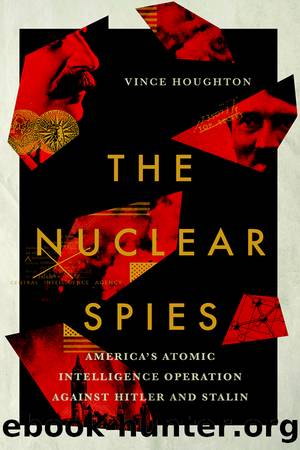The Nuclear Spies: America's Atomic Intelligence Operation Against Hitler and Stalin by Vince Houghton

Author:Vince Houghton [Houghton, Vince]
Language: eng
Format: epub
Tags: Nuclear Warfare, Science, War, Military, Political Science, History, Politics, Intelligence & Espionage
ISBN: 9781501739606
Google: YA2QDwAAQBAJ
Goodreads: 43212202
Publisher: Cornell University Press
Published: 2019-09-01T00:00:00+00:00
5
Regression
The Postwar Devolution of U.S. Nuclear Intelligence
Discussions about the nature of postwar U.S. intelligence began almost a year before the Second World War ended. In October 1944, Office of Strategic Services director William Donovan met with President Roosevelt to recommend a permanent, centralized intelligence agency placed under the direct supervision of the president. Donovan understood that the OSS was created as a wartime agency designed to support the military directly, and was thus placed under the control of the Joint Chiefs of Staff. His new peacetime agency, he argued, should focus on national and not just military intelligence. The executive branch, with the assistance of both the War and Navy Departments and the secretary of state, should coordinate the new organization. Roosevelt, who had come to trust Donovanâs experience and insight, agreed in principle with Donovanâs plan, but Rooseveltâs death on April 12, 1945, put the OSS directorâs proposal in jeopardy.1
Roosevelt had protected Donovan from much of the bureaucratic infighting that characterized the relations between U.S. intelligence agencies during the Second World War. Army and Navy Intelligence, the Department of State, and the Federal Bureau of Investigation had formed intelligence organizations long before the start of the war,2 and only Rooseveltâs favor had kept the upstart OSS on relatively equal footing. Rooseveltâs death, and Harry Trumanâs rise to the presidency, meant that Donovan would have to fight the parochial interests of each of these agencies without his powerful patron. Truman, as he later explained in his memoirs, was open to the idea of a âsound, well-organized intelligence system,â and he agreed that âplans needed to be made.â But he argued that âit was imperative that [the United States] refrain from rushing into something that would produce harmful and unnecessary rivalries among the various intelligence agencies.â3
Download
This site does not store any files on its server. We only index and link to content provided by other sites. Please contact the content providers to delete copyright contents if any and email us, we'll remove relevant links or contents immediately.
| Espionage | Hoaxes & Deceptions |
| Murder & Mayhem | Organized Crime |
| Serial Killers | White Collar Crime |
Mindhunter: Inside the FBI's Elite Serial Crime Unit by John E. Douglas & Mark Olshaker(9324)
Wiseguy by Nicholas Pileggi(5770)
Room 212 by Kate Stewart(5105)
Hitman by Howie Carr(5089)
Secrecy World by Jake Bernstein(4741)
Killers of the Flower Moon: The Osage Murders and the Birth of the FBI by David Grann(4435)
Papillon (English) by Henri Charrière(4263)
Breaking Free by Rachel Jeffs(4216)
Killers of the Flower Moon by David Grann(4039)
Say Nothing by Patrick Radden Keefe(3975)
American Kingpin by Nick Bilton(3876)
The Secret Barrister by The Secret Barrister(3697)
Molly's Game: From Hollywood's Elite to Wall Street's Billionaire Boys Club, My High-Stakes Adventure in the World of Underground Poker by Molly Bloom(3529)
Mysteries by Colin Wilson(3447)
In Cold Blood by Truman Capote(3375)
Signature in the Cell: DNA and the Evidence for Intelligent Design by Stephen C. Meyer(3131)
I'll Be Gone in the Dark by Michelle McNamara(3082)
Rogue Trader by Leeson Nick(3039)
Bunk by Kevin Young(2993)
